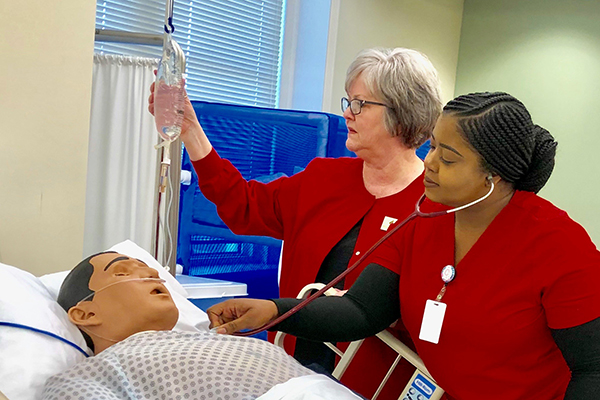By Carrie Brown McWhorter
The Alabama Baptist
Hospital hallways are places where values intersect and where profound decisions can be shaped by individuals’ religious and spiritual beliefs.”
Bioethicist and medical student Danish Zaidi wrote these words in the American Medical Association Journal of Ethics in 2018.
There are potential benefits of integrating patient religion and spirituality into clinical practice by improving empathy, building trust and understanding behaviors, Zaidi wrote.
She also noted that many educators see the need for health care practitioners to better understand their patients’ spiritual backgrounds.
Integrated approach
Christian colleges have long understood the connections between the physical and spiritual.
As the need for health care providers grows in Alabama and the nation, faith-based higher education institutions are in a unique position to train future professionals in a way that considers the whole person — body, mind and spirit.
Health care programs in Alabama Baptist colleges and other faith-based colleges also meet a tremendous need.
Like many states Alabama has an aging population, which brings a growing need for nurses, personal care aids, emergency medical technicians, physical therapists, medical assistants and other health professionals.
By most estimates more than half of the 25 fastest-growing jobs in Alabama are health care related.
Growing career path
Data provided by the Alabama State Nurses Association states that by 2020 there will be 1.6 million nursing job openings nationwide, 700,000 of which will be newly created jobs. Alabama officials estimate the state will need about 6,500 more registered nurses in the next five years.
In recent years University of Mobile (UM), Samford University and Judson College have expanded their offerings in health care fields, including nursing.
Last year UM opened the Center for Excellence in Healthcare Practice, which serves as the academic home of state-of-the-art simulation labs and classrooms for the College of Health Professions.
In December, 16 students became the first to graduate from UM’s new master’s level family nurse practitioner program.
Rita Croom, dean of the College of Health Professions, called their graduation a “historic moment in the life of University of Mobile but also for our community, as these advanced practice nurses enter the workforce using the knowledge and skills they gained to improve patient care,” she said.
Degree offerings like the doctor of nursing practice and the accelerated bachelor of science in nursing are giving students even more options to be “servants of Christ … prepared to go out and serve the community,” said UM President Timothy Smith.
Realistic interactions
Samford’s new post-master’s doctor of nursing practice also provides advanced training for nurses and options for those desiring to teach or lead in a school of nursing.
Samford students benefit from the 22,000-square-feet Experiential Learning and Simulation Center in Samford’s College of Health Sciences, which provides realistic interactions between instructors and students in a simulated clinical environment.
“The combination of having different levels of simulation — from clinical labs to our high-fidelity suite — within the same space gives our students the advantage of experiencing various clinical settings before stepping into practice,” said Jill Pence, the center’s executive director.
Rural healthcare
The two-year associate degree in nursing program at Judson College also emphasizes academic excellence in a Christian environment, as well as hands-on service opportunities and clinical experiences in medical facilities across the Alabama Black Belt, according to Robin Parnell, director of Judson’s nursing program.
Students learn new skills and practice them in labs with state-of-the-art computerized simulators.
The combination of simulated lab experiences and real-world clinical experiences “prepares Judson students to provide quality, compassionate care as registered nurses,” Parnell said. “The low student-faculty ratio allows the student to get the individual attention and support needed to reach her highest potential.”






Share with others: